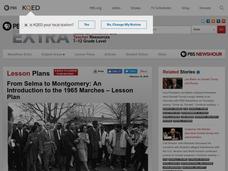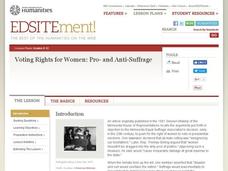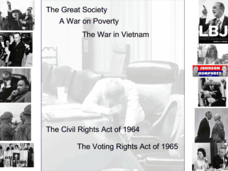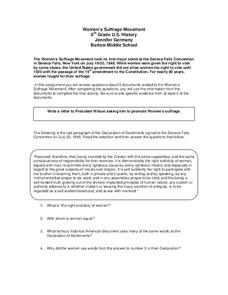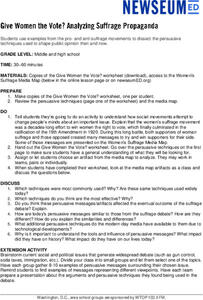PBS
From Selma to Montgomery: An Introduction to the 1965 Marches
The 1965 Civil Rights marches from Selma to Montgomery and the resulting Voting Rights Act of 1965 are the focus of a social studies lesson. The resource uses film clips to inform viewers not only about the discrimination that gave rise...
PBS
Gloria Steinem’s Ancestry and Women’s Rights Movements: Lesson Plan | Finding Your Roots
Introduce class members to Presidential Medal of Freedom winner, activist, writer, and lecturer Gloria Steinem with a PBS resource that not only investigates Steinem's ancestry but also encourages learners to trace their own.
Curated OER
Voting Rights for Women: Pro- and Anti-Suffrage
Students examine the arguments for and against suffrage for women in the 19th and early 20th centuries. They explore various websites, read and discuss primary source documents, develop a document from two points of view, and analyze...
Center for Civic Education
Citizenship Schools and Civic Education During the Civil Rights Movement and in the Present
Your young historians will discover the importance that citizenship education has played in the social progress of the United States as they learn about early efforts to discourage African Americans from voting in the 1960s.
Curated OER
Impact of the Civil Rights Movement on American Policies, Laws and Procedures
For this history worksheet, students participate in a voter registration simulation where their trying to get Black Americans registered to vote in Mississippi in 1961. Students create a "memory trunk" that documents their experiences.
Soft Schools
Civil Rights
Informational text about the Civil Rights Movement challenges young historians to prove their reading comprehension skills with six multiple choice questions. After answers are submitted a new screen displays a score, answers—correct and...
DocsTeach
The 19th Amendment and the Road to Universal Suffrage
Your vote matters! An informative activity focuses on the Nineteenth Amendment and explains how it paved the way for universal voting rights. Young historians analyze several documents and a complete a worksheet, describing the impact of...
City University of New York
Analysis Worksheet: The Supreme Court Declares that the Constitution Does Not Protect Women's Right to Vote
In this voting rights instructional activity, students read instructor-assigned pages about the Supreme Court decision that women did not have the right to vote and then respond to 3 short answer questions.
Curated OER
President LBJ
Here's a quick look at the Johnson presidency. Each of his major acts are discussed with images and video web links. The Voting Rights Act, Tet Offensive, Civil Rights Act, and War on Poverty are defined.
NYC Department of Records
Citizenship and Elections: The Importance of a Ballot
Approximately 58 prcent of those eligible voted in the 2016 US Presidential election. In an attempt to impress upon learners the importance of voting and voting rights, class members examine primary source documents related to the...
Curated OER
Women’s Suffrage Movement
Though the movement for Women's Suffrage stretched over several decades and across two centuries, the final few years were the most difficult hurdle in many ways. Use a document-based question writing exercise to make inferences about...
Curated OER
The Journey to Civil Rights
Students explore several significant figures and events of the Civil Rights Movement and sequence the key events to create a timeline. The instructional activity utilizes the story, "The Story of Ruby Bridges," the work of Robert Coles...
Curated OER
The Civil Rights Movement
High schoolers examine the Jim Crow Laws and goals of the Civil Rights movement. They read and discuss handouts, answer questions, conduct research, and write an essay about the effects of the Civil Rights movement.
Atlanta History Center
Civil Disobedience and the Atlanta Student Movement
What tactics are used in civil disobedience? Learners study the conditions in Alabama that led to the establishment of the Atlanta Student Movement, as well as consider the nature and effectiveness of civil disobedience.
National Woman's History Museum
Women's Suffrage Movement
The National Women's History Museum offers a 20-slide presentation that details the history of the Women's Suffrage Movement from its creation in the 1830s through the passage of the Nineteenth Amendment in 1920.
Curated OER
Voices: Voting Rights
Students examine the history of the right to vote in the United States. For this civics lesson, students research steps taken during the Civil Rights Movement to secure the rights of African Americans to vote.
Alabama Department of Archives and History
Voting Rights for Alabama Women
What were the arguments put forth by those who opposed the 19th Amendment? For those in favor? Class members examine primary source materials that illustrate the intense debate in Alabama about women's suffrage.
National Woman's History Museum
19th Amendment
As part of a study of the women's suffrage movement and the ratification of the Nineteenth Amendment, young historians examine documents that detail when voting rights were granted to women in various countries and when US states...
Center for History Education
Women's Rights in the American Century
Today, many young people find it hard to understand why it took over 150 years for women in the United States to get the right to vote—why there was even a need for the suffrage movement. As they read a series of primary source...
Syracuse University
Women's Suffrage Movement
Women gained the right to vote in the twentieth century, but the fight for equality dates back centuries. Using an invitation to an 1874 suffrage convention, eager historians consider the motivations behind supporters of the suffrage...
EngageNY
Grade 11 ELA Module 2: Unit 2, Lesson 6
How did the women's rights movement create a ripple effect, improving the lives of future generations? Scholars read and analyze paragraphs 11-12 of "An Address by Elizabeth Cady Stanton," in which the author emphasizes the importance of...
DocsTeach
Analyzing a Letter to Congress About Bloody Sunday
The brutality of Bloody Sunday—when non-violent protesters who supported voting rights for African Americans were beaten by police—captured a nation. Young historians examine the letter of one horrified American to Congress to consider...
The Guardian
A Timeline of Women's Right to Vote
Which countries implemented women's suffrage before the 19th amendment went into effect in the United States? Which countries still do not allow women to vote? Watch the global spread of women's rights in an interactive timeline that...
Newseum
Give Women the Vote? Analyzing Suffrage Propaganda
Propaganda is often used to shape public opinion. Scholars investigate the persuasive techniques used by the pro- and anti-suffrage movements. Groups compare how these devices were used during the suffrage movement with how the same...


